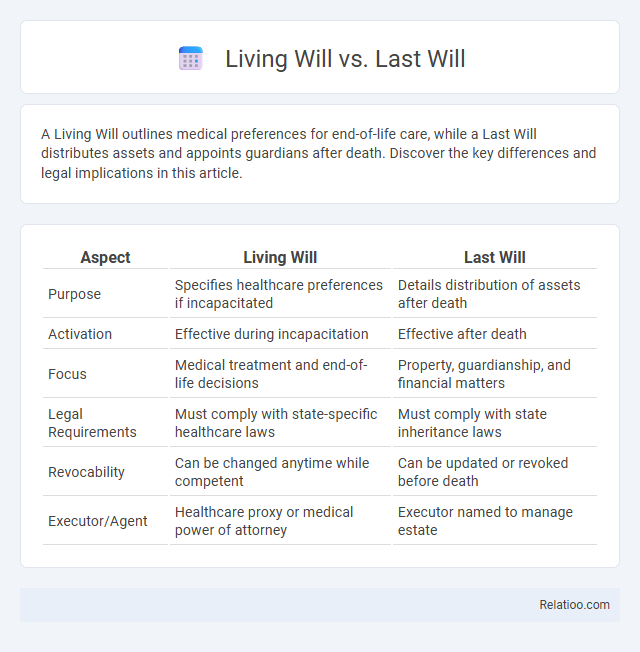A Living Will outlines medical preferences for end-of-life care, while a Last Will distributes assets and appoints guardians after death. Discover the key differences and legal implications in this article.
Table of Comparison
| Aspect | Living Will | Last Will |
|---|---|---|
| Purpose | Specifies healthcare preferences if incapacitated | Details distribution of assets after death |
| Activation | Effective during incapacitation | Effective after death |
| Focus | Medical treatment and end-of-life decisions | Property, guardianship, and financial matters |
| Legal Requirements | Must comply with state-specific healthcare laws | Must comply with state inheritance laws |
| Revocability | Can be changed anytime while competent | Can be updated or revoked before death |
| Executor/Agent | Healthcare proxy or medical power of attorney | Executor named to manage estate |
Understanding the Difference: Living Will vs Last Will
A Living Will outlines your medical care preferences if you become incapacitated, ensuring your healthcare decisions are respected. Your Last Will directs how your assets and property are distributed after your death, appointing executors and guardians if needed. Understanding the difference helps protect both your healthcare wishes and your estate planning effectively.
What Is a Living Will?
A living will is a legal document that outlines your medical care preferences when you are unable to communicate decisions due to incapacitation or terminal illness. Unlike a last will, which distributes your assets after death, a living will focuses solely on healthcare directives, guiding doctors and family members on treatments you want or wish to avoid. Your living will ensures that your healthcare choices are respected, providing clarity and peace of mind during critical medical situations.
What Is a Last Will?
A Last Will is a legally binding document that outlines how a person's assets and property should be distributed after their death, appointing an executor to manage the estate. It can also designate guardians for minor children and specify funeral arrangements, ensuring the deceased's final wishes are honored. Unlike a Living Will or a Legacy, a Last Will takes effect only upon death and must go through probate to be executed.
Legal Purposes of Living Wills and Last Wills
Living wills serve a critical legal purpose by specifying your healthcare preferences when you are incapacitated, ensuring your medical treatment aligns with your wishes. Last wills, on the other hand, legally direct the distribution of your assets and the care of any minor children after your death, offering clear instructions to avoid disputes. Understanding the distinct legal functions of living wills and last wills protects your rights and secures your legacy according to your intentions.
Key Elements of a Living Will
A Living Will primarily focuses on medical directives, specifying treatments and interventions an individual consents to or refuses during incapacitation. Key elements include instructions on life-sustaining measures, resuscitation orders, and organ donation preferences. Unlike a Last Will, which governs asset distribution after death, and a Legacy, which emphasizes personal messages or values for heirs, a Living Will ensures healthcare decisions align with the individual's wishes.
Essential Components of a Last Will
A Last Will includes essential components such as the testator's identification, clear designation of beneficiaries, and detailed instructions for the distribution of assets. It also appoints an executor to manage the estate and names guardians for minor children if applicable. Your Last Will ensures your wishes are legally documented, guiding the probate process and protecting your heirs.
When Does Each Will Take Effect?
A Living Will takes effect immediately when you become incapacitated and unable to communicate your medical decisions, guiding healthcare providers in critical situations. Your Last Will only becomes effective after your death, detailing how your assets and property should be distributed among beneficiaries. A Legacy is often broader, encompassing not just legal directives but also personal messages or values you wish to leave behind, and typically takes effect posthumously alongside or outside your Last Will.
Benefits of Having Both Documents
Living wills and last wills serve distinct purposes, with living wills outlining healthcare preferences during incapacitation and last wills specifying asset distribution and guardianship after death. Having both documents ensures comprehensive protection, allowing individuals to control medical decisions while securing their financial legacy. This dual approach reduces family disputes, expedites legal processes, and preserves personal wishes effectively.
Common Misconceptions: Living Will vs Last Will
A common misconception is confusing a Living Will with a Last Will, as they serve distinctly different purposes; a Living Will outlines your healthcare preferences if you become incapacitated, while a Last Will distributes your assets after death. Many people mistakenly believe a Living Will addresses financial or property matters, but it solely focuses on medical decisions. Understanding the difference empowers you to ensure both your healthcare wishes and estate plans are properly documented.
How to Create a Living Will and Last Will
Creating a Living Will involves documenting your healthcare preferences for situations where you become unable to communicate, specifying treatments you do or do not want. For a Last Will, you must clearly outline the distribution of your assets, name an executor, and appoint guardians for minors if applicable, then ensure it is signed and witnessed according to your jurisdiction's legal requirements. Your informed decisions in these documents protect your wishes and provide clarity for your loved ones during difficult times.

Infographic: Living Will vs Last Will
 relatioo.com
relatioo.com